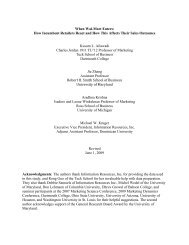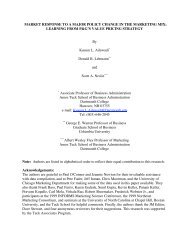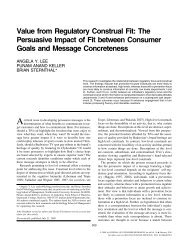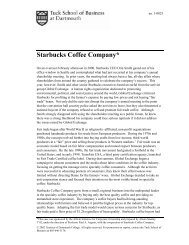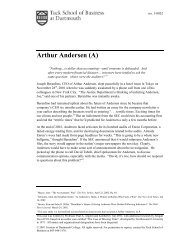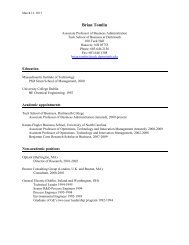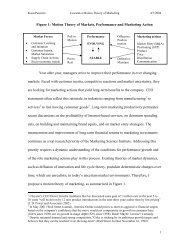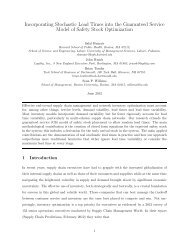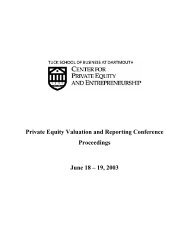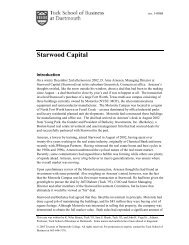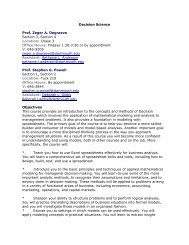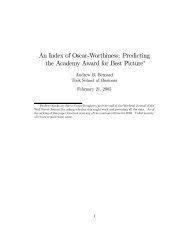tax notes international - Tuck School of Business - Dartmouth College
tax notes international - Tuck School of Business - Dartmouth College
tax notes international - Tuck School of Business - Dartmouth College
You also want an ePaper? Increase the reach of your titles
YUMPU automatically turns print PDFs into web optimized ePapers that Google loves.
A few years ago, Lillian Mills, Kaye Newberry, and<br />
William Trautman7 turned the spotlight on areas where<br />
the <strong>tax</strong> community may wish to start looking. First,<br />
financial firms and multinational corporations report<br />
the largest gap between book and <strong>tax</strong>able income, and<br />
the gap is concentrated among the largest firms. Second,<br />
<strong>of</strong>f-balance-sheet structured transactions or special<br />
purpose entities accounted for part <strong>of</strong> the differences.<br />
These researchers may be on to something big. Offbalance-sheet<br />
structured transactions and special purpose<br />
entities have been identified as culprits behind the<br />
economic crisis. And financial institutions are the primary<br />
players in this game.<br />
As much as he might have liked to use that evidence<br />
to conclude that firms exploit book-<strong>tax</strong> differences,<br />
Shackelford could not reassure users <strong>of</strong> financial statements<br />
that their data were up to the task. As the study<br />
<strong>notes</strong>, because we do not know whether using the best<br />
publicly available firm-level <strong>tax</strong> data ‘‘leads to minor<br />
mismeasurement or substantial errors in scholarship,<br />
practice, and policy,’’ we should ‘‘interpret scholarly<br />
findings with caution.’’<br />
Firms’ ability to increase their book income without<br />
increasing their <strong>tax</strong> liability has led many to call for<br />
conformity between the two measures. However, there<br />
is no agreement on the wisdom <strong>of</strong> that move. John<br />
McClelland <strong>of</strong> the Treasury Department and Lillian<br />
Mills <strong>of</strong> the University <strong>of</strong> Texas8 summarized the pros<br />
and cons <strong>of</strong> conformity and came out in favor <strong>of</strong> continuing<br />
nonconformity. Shackelford also reports that a<br />
study by Danqing Young and David A. Guenther9 <strong>of</strong><br />
book and <strong>tax</strong> conformity in 13 countries reveals that<br />
countries with a high degree <strong>of</strong> conformity exhibit reduced<br />
<strong>international</strong> capital mobility. From his survey<br />
<strong>of</strong> the issue, Shackelford concludes that ‘‘the empirical<br />
evidence suggests that conformity would adversely affect<br />
the information that financial reports provide the<br />
capital markets.’’ Shackelford calls for more research<br />
rather than for continued nonconformity.<br />
International Financial Reporting Standards<br />
Some conference participants mentioned that because<br />
they require more disclosure than U.S. generally<br />
accepted accounting principles, the move to <strong>international</strong><br />
financial reporting standards might help address<br />
the issues that arise under book-<strong>tax</strong> nonconformity. In<br />
7 Lillian Mills, Kaye Newberry, and William Trautman,<br />
‘‘Trends in Book-Tax Income and Balance Sheet Differences,’’<br />
Tax Notes, Aug. 19, 2002, p. 1109, Doc 2002-19155, or2002 TNT<br />
161-49.<br />
8 John McClelland and Lillian Mills, ‘‘Weighing Benefits and<br />
Risks <strong>of</strong> Taxing Book Income,’’ Tax Notes, Feb. 19, 2007, p. 779,<br />
Doc 2007-1810, or2007 TNT 35-61.<br />
9 Danqing Young and David A. Guenther, ‘‘Financial Reporting<br />
Environments and International Capital Mobility,’’ 41 Journal<br />
<strong>of</strong> Accounting Research, 553-579 (2003).<br />
HIGHLIGHTS<br />
August 2008 the Securities and Exchange Commission<br />
issued for comment a proposal to start allowing voluntary<br />
adopting <strong>of</strong> IFRS, and eventual mandatory adoption<br />
beginning in fiscal 2014. A more general move to<br />
adapt U.S. rules to IFRS may be postponed. The Global<br />
Oversight Committee <strong>of</strong> the Financial Executives<br />
Institute recently removed the Accounting Principles<br />
Board (APB) Opinion No. 23, ‘‘Accounting for Income<br />
Taxes — Special Areas,’’ exception for the treatment <strong>of</strong><br />
permanently reinvested earnings (PRE) from the convergence<br />
project.<br />
Other conference participants warned that although<br />
the accounting pr<strong>of</strong>ession is moving toward <strong>international</strong><br />
rules, the U.S. Congress might be unwilling to<br />
cede its ability to provide <strong>tax</strong> incentives to an <strong>international</strong><br />
forum.<br />
Earnings Management<br />
The General Rule<br />
With Congress considering reintroducing a temporary<br />
dividend repatriation <strong>tax</strong> holiday, the way that<br />
corporations account for their foreign earnings may<br />
greatly influence whether a corporation repatriates dividends.<br />
That only a fraction <strong>of</strong> the firms that could<br />
have participated in the 2004 dividend repatriation <strong>tax</strong><br />
holiday took advantage <strong>of</strong> it suggests that the repatriation<br />
decision may be more complicated than initially<br />
understood.<br />
In general, a U.S. multinational pays U.S. <strong>tax</strong> on<br />
foreign earnings only when it receives the dividend<br />
from its foreign subsidiary. However, the accounting<br />
and the <strong>tax</strong> rules differ in how they treat the <strong>tax</strong> liability<br />
associated with those foreign earnings. And it is<br />
that difference that can lead firms to alter their financial<br />
decisions to benefit from the <strong>tax</strong> provisions.<br />
Under GAAP, firms immediately recognize both<br />
their foreign earnings and the expected <strong>tax</strong> associated<br />
with those foreign earnings, although they pay the <strong>tax</strong><br />
only when the earnings are repatriated to the United<br />
States. Thus, for accounting purposes, the firm takes a<br />
hit on its financial earnings, but it benefits by avoiding<br />
an earnings reduction when it later repatriates the<br />
earnings.<br />
That companies may continually reinvest their foreign<br />
earnings complicates the decision. Because many<br />
firms never expect to return their foreign earnings to<br />
the U.S., the accounting rules under APB 23 have,<br />
since 1972, provided an exception to that general rule<br />
that allows the firm to disclose its potential U.S. <strong>tax</strong><br />
liability only in a footnote to its financial statements.<br />
This treatment creates a permanent difference between<br />
book and <strong>tax</strong>able income. The firm immediately benefits<br />
when it declares that it is permanently reinvesting<br />
its foreign earnings, because it recognizes those earnings<br />
without recognizing a related <strong>tax</strong> expense for the<br />
residual U.S. <strong>tax</strong> on those earnings.<br />
TAX NOTES INTERNATIONAL FEBRUARY 2, 2009 • 373<br />
(C) Tax Analysts 2009. All rights reserved. Tax Analysts does not claim copyright in any public domain or third party content.



